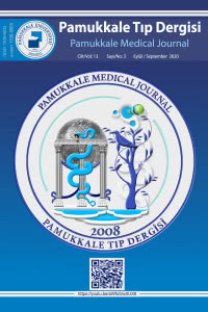İntrauterin inseminasyon uygulanan hastalarda serum vitamin D seviyesinin gebelik ile ilişkisi
İnfertilite, intrauterin inseminasyon, vitamin D, gebelik
The relationship between serum vitamin D levels and pregnancy in patients undergoing intrauterine insemination
Infertility, intrauterine insemination, vitamin D, pregnancy,
___
- Ayeleke RO, Asseler JD, Cohlen BJ, Veltman-Verhulst SM. Intra-uterine insemination for unexplained subfertility. Cochrane Database Syst Rev 2020;3:CD001838. https://doi.org/10.1002/14651858.CD001838.pub6
- Chen Y, Zhi X. Roles of Vitamin D in reproductive systems and assisted reproductive technology. Endocrinology 2020;161. https://doi.org/10.1210/endocr/bqaa023
- Luk J, Torrealday S, Neal Perry G, Pal L. Relevance of vitamin D in reproduction. Hum Reprod 2012;27:3015-3027. https://doi.org/10.1093/humrep/des248
- Irani M, Merhi Z. Role of vitamin D in ovarian physiology and its implication in reproduction: a systematic review. Fertil Steril 2014;102:460-468.e3. https://doi.org/10.1016/j.fertnstert.2014.04.046
- Kinuta K, Tanaka H, Moriwake T, Aya K, Kato S, Seino Y. Vitamin D is an important factor in estrogen biosynthesis of both female and male gonads. Endocrinology 2000;141:1317-1324. https://doi.org/10.1210/endo.141.4.7403
- Lerchbaum E, Rabe T. Vitamin D and female fertility. Curr Opin Obstet Gynecol 2014;26:145-150. https://doi.org/10.1097/GCO.0000000000000065
- Rudick B, Ingles S, Chung K, Stanczyk F, Paulson R, Bendikson K. Characterizing the influence of vitamin D levels on IVF outcomes. Hum Reprod 2012;27:3321-3327. https://doi.org/10.1093/humrep/des280
- Rudick BJ, Ingles SA, Chung K, Stanczyk FZ, Paulson RJ, Bendikson KA. Influence of vitamin D levels on in vitro fertilization outcomes in donor-recipient cycles. Fertil Steril 2014;101:447-52. https://doi.org/10.1016/j.fertnstert.2013.10.008
- Ozkan S, Jindal S, Greenseid K, et al. Replete vitamin D stores predict reproductive success following in vitro fertilization. Fertil Steril 2010;94:1314-1319. https://doi.org/10.1016/j.fertnstert.2009.05.019
- Zhao J, Huang X, Xu B, Yan Y, Zhang Q, Li Y. Whether vitamin D was associated with clinical outcome after IVF/ICSI: a systematic review and meta-analysis. Reprod Biol Endocrinol 2018;16:13. https://doi.org/10.1186/s12958-018-0324-3
- Anifandis GM, Dafopoulos K, Messini CI, et al. Prognostic value of follicular fluid 25-OH vitamin D and glucose levels in the IVF outcome. Reprod Biol Endocrinol 2010;8:91. https://doi.org/10.1186/1477-7827-8-91
- Firouzabadi RD, Rahmani E, Rahsepar M, Firouzabadi MM. Value of follicular fluid vitamin D in predicting the pregnancy rate in an IVF program. Arch Gynecol Obstet 2014;289:201-206. https://doi.org/10.1007/s00404-013-2959-9
- Franasiak JM, Molinaro TA, Dubell EK, et al. Vitamin D levels do not affect IVF outcomes following the transfer of euploid blastocysts. Am J Obstet Gynecol 2015;212:315.e1-6. https://doi.org/10.1016/j.ajog.2014.09.029
- Neville G, Martyn F, Kilbane M, et al. Vitamin D status and fertility outcomes during winter among couples undergoing in vitro fertilization/intracytoplasmic sperm injection. Int J Gynaecol Obstet 2016;135:172-176. https://doi.org/10.1016/j.ijgo.2016.04.018
- World health organization. WHO laboratory manual for the examination and processing of human semen. 5th ed. Geneva: World Health Organization; 2010.
- Türkiye endokrinoloji ve metabolizma derneği. Vitamin D eksikliği. In: Osteoporoz ve metabolik kemik hastalıkları tanı ve tedavi kılavuzu. 14. ed., Ankara: 2019; 119-127.
- Lerchbaum E, Obermayer-Pietsch B. Vitamin D and fertility: a systematic review. Eur J Endocrinol 2012;166:765-778. https://doi.org/10.1530/EJE-11-0984
- Lv SS, Wang JY, Wang XQ, Wang Y, Xu Y. Serum vitamin D status and in vitro fertilization outcomes: a systematic review and meta-analysis. Arch Gynecol Obstet 2016;293:1339-1345. https://doi.org/10.1007/s00404-016-4058-1
- Parikh G, Varadinova M, Suwandhi P, et al. Vitamin D regulates steroidogenesis and insulin-like growth factor binding protein-1 (IGFBP-1) production in human ovarian cells. Horm Metab Res 2010;42:754-757. https://doi.org/10.1055/s-0030-1262837
- Yoshizawa T, Handa Y, Uematsu Y, et al. Mice lacking the vitamin D receptor exhibit impaired bone formation, uterine hypoplasia and growth retardation after weaning. Nat Genet 1997;16:391-396. https://doi.org/10.1038/ng0897-391
- Liu X, Zhang W, Xu Y, et al. Effect of vitamin D status on normal fertilization rate following in vitro fertilization. Reprod Biol Endocrinol 2019;17:59. https://doi.org/10.1186/s12958-019-0500-0
- Yilmaz N, Ersoy E, Tokmak A, et al. Do serum vitamin D levels have any effect on intrauterine insemination success? Int J Fertil Steril 2018;12:164-168. https://doi.org/10.22074/ijfs.2018.5256
- Asadi M, Matin N, Frootan M, Mohamadpour J, Qorbani M, Tanha FD. Vitamin D improves endometrial thickness in PCOS women who need intrauterine insemination: a randomized double-blind placebo-controlled trial. Arch Gynecol Obstet 2014;289:865-870. https://doi.org/10.1007/s00404-013-3055-x
- ISSN: 1309-9833
- Yayın Aralığı: Yılda 4 Sayı
- Başlangıç: 2008
- Yayıncı: Prof.Dr.Eylem Değirmenci
Tümör nedenli toraks duvar rezeksiyonunda morbiditeyi etkileyen faktörler
Umut PAMUKÇU, BÜLENT ALTUNKAYNAK, İLKAY PEKER
Türkiye’de Batı Karadeniz bölgesindeki çocukların D vitamini düzeyleri
Soner GÖK, Berfin GÖK, Ozan ÇETİN
Tümör nedeniyle toraks duvar rezeksiyonunda morbiditeyi etkileyen faktörler
Kronik kazeifiye granülomatöz endometrit
Ayhan ATIGAN, Soner GÖK, Yeliz ARMAN KARAKAYA
Hazar HARBALIOĞLU, Ömer GENÇ, Abdullah YILDIRIM
Çocukluk çağı aşılarına yönelik ebeveyn tutumları ölçeğinin Türkçeye kültürel ve dil uyarlaması
İrem AKDEMİR KALKAN, Meryem ÖREN, TUBA DAL, Yeşim YILDIZ, Yakup DEMİR, Ömer KARAŞAHİN, Fesih AKTAR, Selim BADUR, Merve AYHAN, Mustafa Kemal ÇELEN
Vitamin D uygulamasının endometrium üzerine etkisi
Multiple skalp ve ekstremite yerleşimli aplazia kutis konjenita
